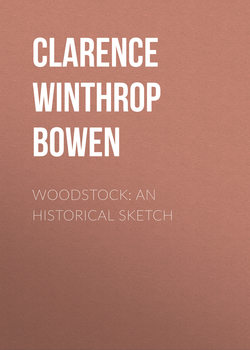Woodstock: An historical sketch

Реклама. ООО «ЛитРес», ИНН: 7719571260.
Оглавление
Clarence Winthrop Bowen. Woodstock: An historical sketch
I
II
III
IV
V
VI
VII
VIII
IX
X
XI
XII
XIII
Отрывок из книги
The history of the town of Woodstock is associated with the beginnings of history in New England. The ideas of the first settlers of Woodstock were the ideas of the first settlers of the Colony of Plymouth and the Province of Massachusetts Bay. The planting of these colonies was one of the fruits of the Reformation. The antagonism between the Established Church of England and the Non-Conformists led to the settlement of New England. The Puritans of Massachusetts, at first Non-Conformists, became Separatists like the Pilgrims of Plymouth. Pilgrims and Puritans alike accepted persecution and surrendered the comforts of home to obtain religious liberty. They found it in New England; and here, more quickly than in the mother country, they developed also that civil liberty which is now the birthright of every Anglo-Saxon.
Settlements were accordingly made at Salem, Charlestown, Boston, Medford, Watertown, and in several other localities. The sixth settlement was made, to quote further from the same letter to the Countess of Lincoln, by “others of us two miles from Boston, in a place we named Rocksbury.”1
.....
The date of settlement was September 28, 1630, and just three weeks later the first General Court that ever sat in America was held in Boston. The same year the first church in Boston was organized.2 Roxbury, like the other settlements of Massachusetts Bay, was a little republic in itself. The people chose the selectmen and governed themselves; and as early as 1634, like the seven other organized towns, they sent three deputies to Boston to attend the first representative Assembly at which important business was transacted. The government of Roxbury, like the other plantations, was founded on a theocratic basis. Church and state were inseparable. No one could be admitted as a citizen unless he was a member of the church. Many of the first settlers came from Nazing, a small village in England, about twenty miles from London, on the river Lee. Morris, Ruggles, Payson, and Peacock, names read in the earliest records of Woodstock, were old family names in Nazing. Other first inhabitants of Roxbury came from Wales and the west of England, or London and its vicinity. Among the founders were John Johnson, Richard Bugbee, and John Leavens, whose family names are well known as among the first settlers of Woodstock. All were men of property3; none were “of the poorer sort.” In 1631 the Rev. John Eliot, a native of the village of Nazing, arrived with a company of Nazing pilgrims. Eliot, though earnestly solicited to become pastor of the church in Boston,4 accepted the charge of the church in Roxbury, which was organized in 1632,5 and was the sixth church, in order of time, established in New England. Another name equally prominent in the earliest years of the history of Roxbury was that of William Pynchon, afterwards known as the founder of Springfield in Massachusetts. Only Boston excels Roxbury in the number of its citizens who have made illustrious the early history of the Massachusetts colony.6 Among the early settlers of Roxbury who themselves became, or whose descendants became, the early settlers of Woodstock, were the Bartholomews, Bowens, Bugbees, Chandlers, Childs, Corbins, Crafts, Griggses, Gareys, Holmeses, Johnsons, Lyons, Levinses, Mays, Morrises, Paysons, Peacocks, Peakes, Perrins, Scarboroughs, and Williamses.7
In 1643 the towns within the jurisdiction of Massachusetts had grown to thirty, and Roxbury did more than her share towards the organization of the new towns. In fact, Roxbury has been called the mother of towns, no less than fifteen communities having been founded by her citizens.8 Among the most important of these settlements was the town of Woodstock, whose Bicentennial we this day celebrate.
.....